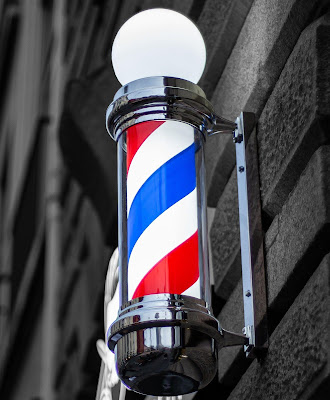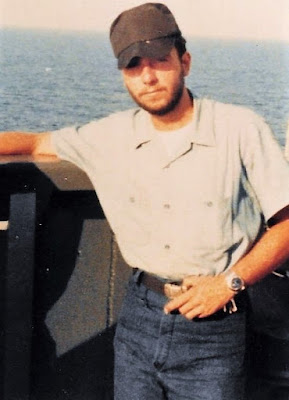California Liberty
By Paul Davis
I was just returning from evening chow after my eight-hour watch in the message center aboard the USS Kitty Hawk as the aircraft carrier launched aircraft from “Yankee Station” in the Gulf of Tonkin off the coast of North Vietnam in 1971.
As I entered the Radio Communications Division's enlisted men's compartment, I heard Salvatore Lorino’s distinctive raspy, fast-paced voice.
Lorino often visited me while we were on Yankee Station, partly because we were both from South Philly and became friends, and partly because he had two meth customers in the division.
Lorino, a young hoodlum whom I knew slightly from the South Philadelphia neighborhood where I was raised, was several years older than I. He was about six feet tall, lean, with black hair, rugged features, and a long face with a perpetual lopsided grin that alternately charmed and menaced.
Entering the compartment, I saw Lorino sitting in a folding chair across from Ingemi, Hunt and a couple of other sailors. The radiomen were laughing at a story Lorino was telling them.
“Hey, Paulie, I was jes telling them about the time we went to the bullfights in TJ,” Lorino said as I sat down and listened to the story of our trip to Tujuana, Mexico.
“We was out of Boot Camp for only three months, so we was jes a couple of “Boots” from South Philly when we went down to the border…”
As he told the tale, I counted. Lorino got seven out of ten facts wrong.
While we were stationed in San Diego prior to setting sail for Southeast Asia, we were on three-section duty, which meant that Lorino and I had two out of three weekends off. I liked San Diego, especially Mission Beach, but I was not too fond of the honky-tonk bars that most of the sailors and Marines frequented in the downtown area. I preferred to visit the bars near the local colleges, where the girls were mostly from out of town, just like us.
I also liked to visit Tijuana, which was just across the border from San Diego. I laughed as Lorino began his tale, recalling how Lorino rooted for the bull rather than the matador. At one point, Lorino stood up and shouted out to the bull, “Now! Get ‘em now!”
The Mexican bullfight aficionados around us were not amused by the loco gringo, but the Kitty Hawk radiomen hearing the story certainly were.
Lorino then launched into telling another liberty story. Lorino went on to tell the sailors in the compartment about the time we visited a club on Sunset Strip in Los Angeles.
“We was in a club in LA and Paulie got us the two best looking girls in the place.”
Lorino and I traveled in civies when we ventured to Los Angeles. I was fond of LA and liked the vibrant city’s nightlife, and I visited there previously on many of my free weekends. I liked to go to West Hollywood and hit the “happening” clubs on the mile and half of Sunset Boulevard that was known famously as the “Sunset Strip.”
I told Lorino about the Strip and how it was home to trendy restaurants, sleazy bars and hip nightclubs. The Strip was a girl watchers’ delight and walking the Strip at night was like being part of a wild parade. Someone called the Strip a “cultural carnival.”
I also liked the great rock music played at the clubs there and I liked dancing with the young, pretty girls. Growing up in South Philly, I had gone to teenage dances every weekend, so I knew that hitting the dance floor and dancing well was a good way to meet girls.
Along with servicemen like Lorino and I, there were hippies, college students, tourists, music and movie people, and almost everything in between at the clubs.
I wore my "civies" to the clubs, but unfortunately, like the other servicemen with regulation short hair, Lorino and I stood out from the young men who sported the longer hairstyles of the day. It appeared that the prettiest and most desirable girls shied away from military guys.
On the night Lorino was telling the Kitty Hawk sailors about, I asked an exceptionally good-looking college student named Susan to dance with me at a club on the Strip. She was a pretty, shapely blonde and she wore a loose blouse and tight dungarees.
“I like your high black boots,” I told her. “You can kick me if you want to.”
She laughed.
I spent a good bit of time with Susan on the crowded dance floor. Lorino grabbed Susan’s girlfriend and took her onto the dance floor as well. After a while, we took a break from dancing, and I bought Susan a drink at the bar. Lorino slid next to me with Susan’s girlfriend in his arms.
Susan was a bit inebriated and giddy. I held her and she looked at me closely.
I grinned, thinking this was a romantic moment and I was about to kiss her.
“Why do you have short hair?” Susan asked, stopping me from leaning in to kiss her. “Are in you in the military?”
I just knew that my being in the Navy would be a “turn off” for her, so I thought fast.
“No, but I don’t want to talk about it,” I replied sheepishly.
“Why not?”
“My hair is cut short because Sal and I just got out of San Quentin prison.”
Her interest and imagination ignited, and she leaned into me and whispered, “Why were you in prison?”
“We robbed a bank.”
I heard Lorino behind me laugh. Susan nodded her head slowly, as if to say she understood. She then smiled, kissed me full on the mouth, and we returned to the dance floor. Lorino and I later took the two girls back to our hotel room.
Apparently, this fresh-faced college girl was just fine with me being a bank robber and ex-con, but she would have surely bolted had I told her I was a sailor.
Go figure.
Thankfully, the girls in Olongapo had no such prejudice against sailors.
On a roll, Lorino also spoke of the time we visited Disneyland in Anaheim, California. On that visit to Disneyland with Lorino, we dared to smoke marijuana openly, boldly, and quite stupidly, as we walked around the popular amusement park.
On the Haunted Mansion ride we shared a joint in our continuously moving vehicle. At one point in the ride, the vehicle pivoted to the right before a mirror, and through Disney’s technological magic, a ghost appeared in the mirror between the reflection of Lorino and I. The ghost grinned and wrapped his arms around us.
Looking at the image between us in the mirror, I offered the joint to the ghost. I thought this was funny, and Lorino thought it was hilarious.
The security guards monitoring the ride through the mirror were not nearly as amused.
At the end of the ride, two security guards dressed as Western Sheriffs stopped our vehicle and ordered us to get out.
“Are you part of the amusement ride?” I asked in jest.
Lorino thought that too was hilarious. The guards remained unamused.
The guards held us in a building until the Anaheim police arrived and took us into custody. We were handcuffed, placed in the police car and driven to the Anaheim police station. We were held in separate rooms. I was searched by an Anaheim police officer, and he confiscated the pocketknife I was carrying.
I was worried about prison and getting kicked out of the Navy. Thankfully, the police officer took pity on me and told me that he was cutting me loose. He said he had been a Marine when he was a young guy, and he also did dumb things then. He told me to take off.
I asked about Lorino, and the officer told me to “Get while the getting is good.”
I asked if I could have my knife back, and the police officer just stared at me in disbelief. I left the police station quickly and took a bus back to San Diego.
Lorino later told me that he was arrested because he was holding more than an ounce of marijuana in a plastic bag in his pocket. He was held over the weekend and appeared before a judge on Monday morning. Lorino pled guilty to possession, was fined, and then released.
Unfortunately for Lorino, the Kitty Hawk shoved off on Monday morning and the carrier went to sea while he stood before the judge. Lorino missed "ship's movement," which was a serious offense. Upon his return to the carrier, Lorino went before a Captain’s Mass and busted back to seaman apprentice and lost a month’s pay.
I felt guilty that I was lucky to not be charged and “skated” through the incident, and left Lorino holding the bag, quite literally. Lorino shrugged and told me not to worry about it.
The sailors sitting around the compartment appeared to be quite amused at the pre-deployment adventures Lorino and I experienced.
© 2025 Paul Davis










.jpg)

